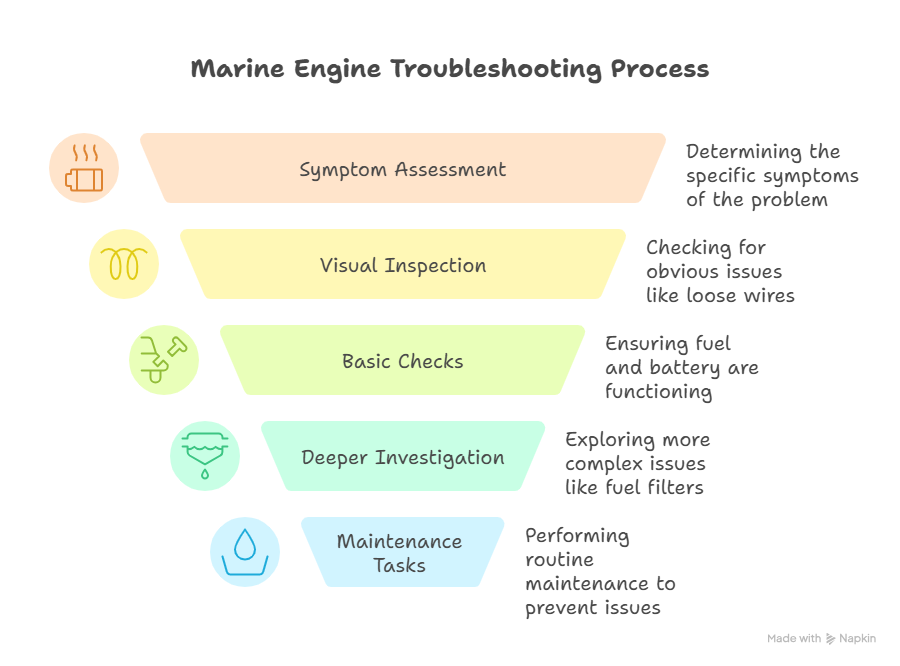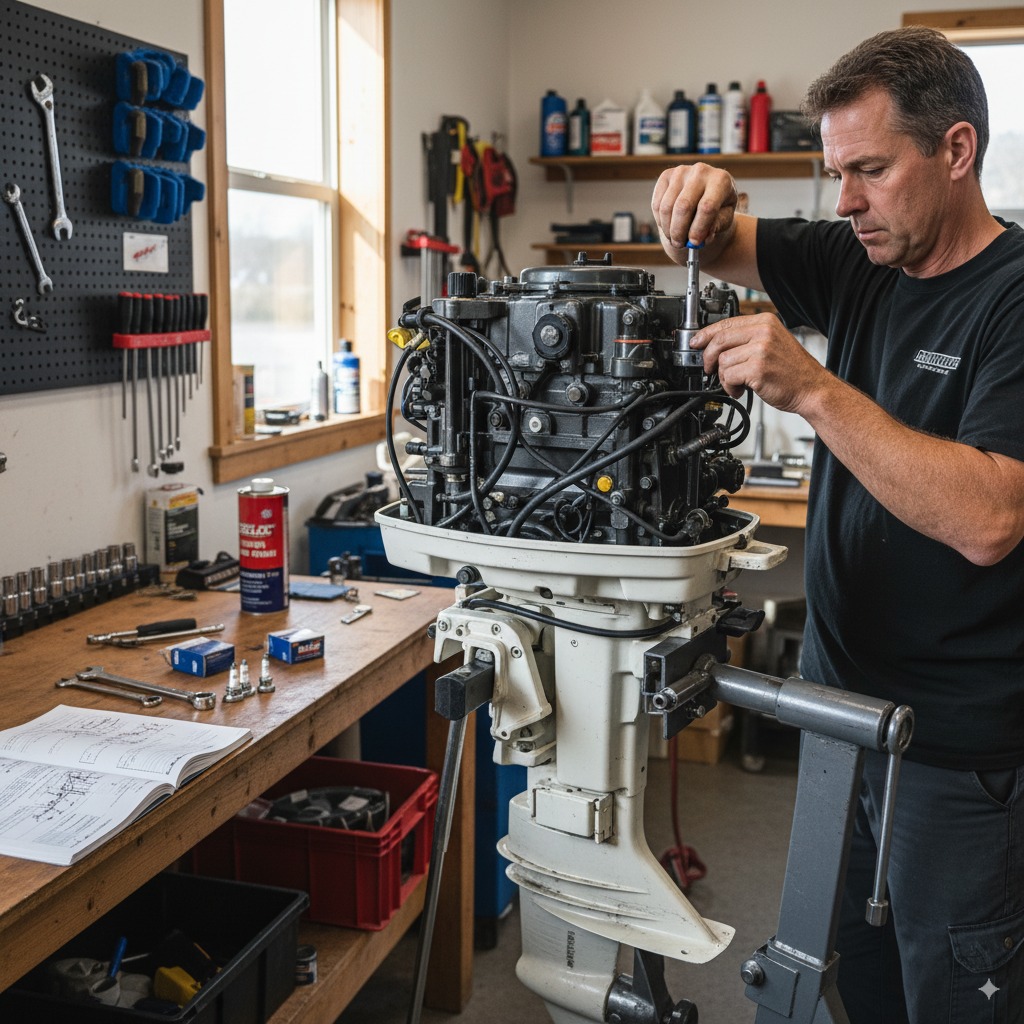I’ve been doing marine engine repair here in South Florida for about 15 years, and if there’s one thing I’ve learned, it’s that a boat engine has a thousand ways to ruin your day. But the truth is, most of them are preventable.
I remember a guy, Mike, who limped into Dinner Key Marina a few summers back. His Sea Ray was overheating, alarms screaming. He was convinced the engine was toast and was already mentally spending $20,000 on a new one. He looked defeated. I told him to pop the hatch. Five minutes later, I pulled a plastic bag and a wad of seaweed out of his raw water intake. I started it up, and it purred like a kitten. The look on his face—a mix of relief and embarrassment—was priceless.
That’s what 90% of marine engine repair is: simple detective work. It’s not black magic. It’s about knowing what to look for and listening to what your engine is telling you.
This guide is everything I’d tell you if we were standing on the dock. No fancy jargon, just the real-world stuff that will keep you on the water and out of my shop. We’ll cover understanding your engine, figuring out what’s wrong, and the simple maintenance that’ll save you a fortune.
Table of Contents
What’s Actually Under the Hood?
Before you can fix anything, you gotta know what you’re looking at. A lot of people treat their engine like a mysterious black box. Don’t do that.
You’ve basically got a few types:
- Inboards: The big, car-like engines tucked inside the hull. Reliable, powerful, but can be a pain to get to.
- Outboards: The powerhouses hanging off the back. Easy to work on, but they live a tough life, getting dunked and bashed around.
- Marine Diesels: The workhorses. They’ll run forever if you treat them right, but they have their own set of rules, especially with their fuel systems.
No matter what you have, they all run on the same basic principles. They need fuel, air, and a spark (or just compression, for diesels) to make noise. The three big systems you need to understand are:
- Fuel System: Gets the gas from the tank to the engine. This is where most problems live.
- Cooling System: Keeps the engine from melting itself into a puddle. This is the second most common trouble spot.
- Electrical System: Makes the spark and runs all the gadgets. This is where things get tricky and where most DIY-ers get into trouble.
The best skill you can learn is to know your engine’s “body language.” What does it sound like when it’s happy? What’s the normal operating temperature? Any new noise or smell is a clue. Listening to those clues is the first step in any marine engine repair.
The Detective Work: Troubleshooting Like a Pro
When your engine acts up, don’t just start swapping parts. That’s the most expensive way to do marine engine repair. Instead, be methodical.
- What are the symptoms? Is it not starting? Overheating? Losing power? Be specific.
- Start with your eyes. Before you grab a wrench, just look. I can’t tell you how many “major” problems were just a loose wire, a cracked hose, or a dirty battery terminal. It sounds too simple, but you’d be surprised.
- Check the easy stuff first. Is there fuel in the tank? Is the battery switch on? Is the safety lanyard clipped in? Don’t be too proud to check the basics. We’ve all been there.
Once you’ve done that, you can start digging deeper. An engine that won’t start is usually a fuel or electrical problem. Overheating is almost always the cooling system—start by checking the water pump impeller. Losing power? It’s often a clogged fuel filter. A systematic approach to marine engine repair will save you a ton of time and frustration.

Prevention is the Best Medicine: My Maintenance Checklist
Want to avoid seeing me? Do your maintenance. It’s that simple. An hour of prevention is worth a thousand dollars in marine engine repair bills.
Here’s the stuff you absolutely have to do:
- Change the Oil and Filters: This is non-negotiable. Clean oil is the lifeblood of your engine.
- Check the Fuel System: Change your fuel filters at least once a season. Look for any signs of water in the fuel.
- The Impeller: Your water pump impeller is a little rubber paddle that pumps cooling water. It gets brittle and breaks. I tell my clients to change it every year or two, no exceptions. It’s a $50 part that can save you from a $10,000 engine replacement. This is the most important preventative marine engine repair task you can do.
- Clean Everything: After every trip in saltwater, flush your engine with fresh water and rinse everything down. Salt is your enemy. It’s quietly destroying your engine while you sleep.
DIY vs. Calling Me: A Quick Cost Breakdown
I’m all for owners getting their hands dirty. But it’s important to know your limits. Here’s a table I put together based on average jobs that come through my shop in Miami.
| Repair Job | DIY Cost (Parts Only) | My Shop’s Average Cost (Parts & Labor) | My Take |
|---|---|---|---|
| Oil Change | $50 – $80 | $150 – $250 | Totally DIY-able. Learn to do this. |
| Impeller Replacement | $30 – $70 | $200 – $400 | A bit more involved, but a great skill to have. |
| Fuel Filter Swap | $20 – $50 | $100 – $150 | Easy. You should be doing this yourself. |
| Starter Motor Replacement | $150 – $300 | $400 – $700 | Can be tricky depending on access. Borderline DIY. |
| Overheating Diagnosis | $50 (Thermostat/Impeller) | $300 – $800+ | Can get complicated fast. If a new impeller doesn’t fix it, call a pro. |
| Engine Rebuild | N/A | $5,000 – $15,000+ | Don’t even think about it. This is pro territory only. |
Knowing when to call for help is a critical part of smart marine engine repair. There’s no shame in it.
FAQ: Questions I Get All the Time at the Dock
My engine is making a new noise. Should I be worried?
Yes. Engines talk to you. A new noise is them telling you something is wrong. It could be nothing, or it could be a sign of impending doom. Don’t ignore it.
How long should a marine engine last?
With proper care, a gas inboard can go 1,500-2,000 hours. A diesel can go 5,000 hours or more. But I’ve seen neglected engines die in 500 hours. Maintenance is everything.
What’s the biggest mistake boat owners make?
Ignoring small problems until they become big, expensive ones. That little drip of oil, that slight hesitation when starting—that’s your engine asking for help. A small, cheap marine engine repair now is better than a huge, expensive one later.
What tools should I absolutely have on my boat?
A good set of wrenches and sockets, a multimeter, a set of screwdrivers, a spare fuel filter, a spare impeller, and a roll of good electrical tape. That will get you out of most common jams.
Is a full engine rebuild ever worth it?
Sometimes. On an older boat where the engine is the only major issue, a rebuild can be a great value. But you have to weigh the cost against the value of the boat. A professional opinion on the overall health of the engine is crucial before making that call. This is the ultimate marine engine repair decision.
Key Takeaways: My Final Advice
Look, marine engine repair doesn’t have to be some big mystery. If you’re going to own a boat, you owe it to yourself to understand the basics. If you remember nothing else, remember this:
- Listen to Your Engine: It will tell you when it’s sick. Pay attention to its normal sounds and smells so you can spot when something changes.
- Be a Detective: Don’t just throw parts at a problem. Start with the simple, obvious stuff first.
- Maintenance Isn’t Optional: It’s the best way to avoid costly marine engine repair. Change your oil, filters, and impeller regularly.
- Know When to Fold ‘Em: Have the courage to tackle the easy jobs and the wisdom to call a pro for the hard ones.
- Safety First, Always: Disconnect the battery. Work in a ventilated area. Have a fire extinguisher handy. No repair is worth getting hurt over.
Your engine is the heart of your boat. Treat it with a little mechanical sympathy, and it will give you years of reliable service. Now go enjoy the water.
Author Bio
I’m Alex, a 15-year marine technician in South Florida, ABYC-certified. I specialize in marine engine repair, from old-school carbureted inboards to modern fuel-injected outboards. I’ve probably rebuilt or repaired every major brand at marinas like Dinner Key and Bahia Mar, helping boaters stay safe and on the water.


Leave a Reply